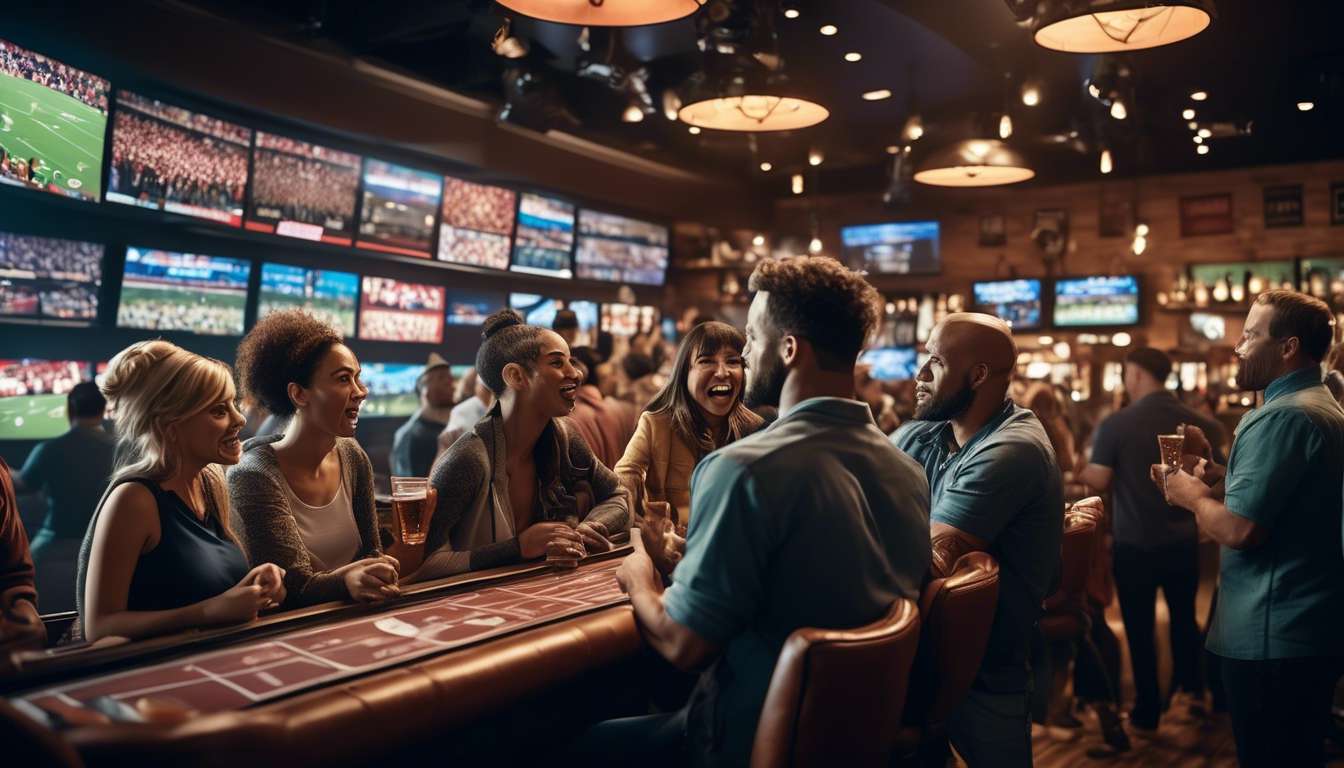Public Predictions and Reality in Sports Betting
As avid sports enthusiasts and frequent participants in the thrilling world of sports betting, we often question: how often are we, the public, actually right in our predictions? This inquiry not only challenges our intuition but also tests our understanding of the games we love.
Analyzing the Data
With every season, there comes a new set of:
- Data
- Trends
- Variables
These factors must be analyzed to make informed bets. Yet, despite our best efforts, the uncertainty of sports outcomes often leaves us wondering if we truly possess the insight we believe we do.
Exploring Public Betting Trends
In this article, we delve into:
- Statistics behind public betting trends
- Psychology of betting behavior
Our goal is to explore how often the collective wisdom of the crowd aligns with reality.
Uncovering Insights
Together, we will uncover insights that could:
- Enhance our betting strategies
- Deepen our appreciation for the unpredictable nature of sports
By understanding these dynamics, we aim to better navigate the thrilling, yet uncertain, world of sports betting.
Examining Public Betting Accuracy
Many bettors often rely on public consensus when making decisions, but the accuracy of these collective predictions is frequently questioned. In our community, where we strive to feel connected and validated in our choices, it’s important to understand the dynamics behind public perception in sports betting.
Cognitive biases often skew our views, making us lean toward popular opinions rather than objective analysis.
- We might think we’re on the right track when everyone seems to agree, but this herd mentality can lead us astray.
Media influence plays a significant role in shaping our perceptions. News outlets and commentators frequently highlight certain teams or players, creating narratives that may not reflect the actual probabilities. As a result:
- We might overestimate a team’s chances based on how they’re portrayed.
- We may overlook their actual performance metrics.
By recognizing these influences, we can better assess the accuracy of public betting and make more informed decisions, strengthening our bond as a community of savvy bettors.
Historical Success Rates in Predictions
We’ve seen varied success rates in historical sports betting predictions, highlighting the challenges of relying solely on collective opinions. As a community, we often think that the crowd’s wisdom can guide us to victory, yet public perception tends to be swayed by cognitive biases and media influence. These elements can distort our view, making it difficult to separate fact from fiction when predicting outcomes.
Cognitive biases like overconfidence and herd mentality can lead us astray, causing us to make bets based on emotional responses rather than objective analysis.
Media influence also plays a significant role by:
- Amplifying certain narratives
- Shaping our expectations
When the media hypes up a team or an athlete, we may feel compelled to follow suit, even when evidence suggests otherwise.
Despite these challenges, understanding the limitations of our perceptions can foster a sense of community and shared learning. By recognizing the historical patterns in sports betting, we can work together to improve our predictive accuracy and make more informed decisions.
Factors Influencing Public Perception
We often find that our perceptions in sports betting are shaped by a complex interplay of psychological factors and external influences. Our collective public perception can be swayed by cognitive biases that skew our judgment.
For instance, the availability heuristic makes us lean toward recent events or memorable outcomes, believing they’re more likely to occur. This bias connects us, creating a shared narrative that feels comforting yet misleading.
As a community, we’re also subject to the bandwagon effect, where seeing others’ choices can sway our own, fostering a sense of belonging. We might not realize how much we crave being part of a larger group, but it deeply influences our betting decisions.
Moreover, media influence plays a pivotal role in shaping our viewpoints. While we won’t dive deep into media’s impact here, it’s undeniable that headlines and commentary can amplify our biases, steering public perception.
Recognizing these factors helps us understand why we’re not always right in sports betting.
Impact of Media on Public Picks
Media Influence on Betting Choices
Media outlets wield significant power in shaping our betting choices by highlighting specific narratives and influencing our expectations. As a community of sports enthusiasts, we often find ourselves swayed by the stories and analyses that flood our screens. These narratives can craft our public perception, making us lean towards certain teams or players, sometimes against our better judgment.
Cognitive Biases and Groupthink
Our cognitive biases come into play as we absorb and internalize media influence. The more we see a particular outcome being discussed, the more likely we are to believe it will happen, creating a sense of consensus among us. This collective belief can lead to groupthink, where we might ignore other important factors in our decision-making process.
Desire for Belonging and Conformity
We’re driven by a desire to belong, to be part of the winning side. When media narratives reinforce popular opinions, we’re inclined to follow suit.
Making Informed Choices
Understanding the impact of media on our picks can help us make more informed and independent betting choices. By recognizing these influences, we can:
- Question prevailing narratives.
- Consider alternate perspectives.
- Evaluate all relevant factors before placing a bet.
This awareness can empower us to resist undue influence and foster more strategic decision-making in our betting endeavors.
Case Studies of Public Consensus
We can learn a lot from examining a few key instances where public betting consensus either led to unexpected wins or surprising losses.
2016 NBA Finals: Cleveland Cavaliers vs. Golden State Warriors
During the 2016 NBA Finals, the Cleveland Cavaliers’ victory over the Golden State Warriors was a major surprise. Public perception heavily favored the Warriors, influenced by their record-breaking season.
- This case highlights how media influence can amplify certain narratives, leading us to overlook potential underdogs.
2018 FIFA World Cup: Germany’s Unexpected Exit
Another example is the 2018 FIFA World Cup, when Germany, the defending champions, were eliminated in the group stage.
- The public, guided by cognitive biases and past performances, overwhelmingly backed Germany.
- Yet, the unexpected occurred, revealing the limits of relying solely on past success.
Key Takeaways
These cases remind us that while we’re part of a collective sports community, it’s crucial to remain aware of how media and cognitive biases shape our perceptions.
By analyzing these instances, we can:
- Better understand when to trust public consensus.
- Learn when to question prevailing narratives.
Staying critical and aware can help us navigate the complex world of sports betting and predictions more effectively.
Cognitive Biases in Betting Decisions
In the realm of sports betting, cognitive biases often cloud our decisions, skewing our perception of probability and risk. As a community, we tend to rely heavily on public perception and media influence, which can lead us astray.
One such bias is the bandwagon effect, where we follow popular opinion without critical analysis. When everyone around us believes in a certain outcome, it feels safer to join in, even if the odds suggest otherwise.
Another influence is the availability heuristic, where recent or vivid media stories dominate our thought processes. For example, if a team has been highlighted for its recent wins, we might overestimate its chances of success in future games.
Anchoring bias further complicates our decisions. Initial information, often from media reports, can disproportionately influence our betting choices.
By acknowledging these biases, we can strive for more informed and balanced betting decisions. This approach fosters a sense of camaraderie and shared wisdom within the betting community.
Evaluating Public vs. Expert Opinions
When weighing public and expert opinions in sports betting, we must carefully consider the expertise and track record of those providing guidance.
Public Perception:
- Often swayed by cognitive biases and media influence.
- Can lead to decisions that don’t pan out as expected.
We’ve all experienced being caught up in the excitement of a popular opinion only to find it didn’t succeed.
Expert Analysis:
- Brings data-driven insights and experience.
- Offers perspectives not always visible at first glance.
However, we shouldn’t dismiss public sentiment outright. It provides:
- A broader perspective.
- Reflection of the collective wisdom of the crowd.
Yet, it’s important to remain aware of potential pitfalls such as:
- Media influence that can amplify certain narratives.
- The risk of herd mentality affecting judgment.
By understanding these dynamics, we can make more informed decisions.
Balanced Approach:
- Value both expert analysis and public perception.
- Stay vigilant against biases that could cloud judgment.
Together, this balanced approach allows us to navigate the betting landscape wisely.
Strategies for Leveraging Public Sentiment
To effectively leverage public sentiment in sports betting, we should analyze trends and identify when the crowd might be overreacting to recent events. Public perception often sways due to cognitive biases and media influence, creating opportunities for us to find value bets.
By understanding these biases, like the recency effect, we can spot when public enthusiasm inflates odds or when fear deflates them unjustly.
Strategies to Consider:
-
Analyze Media Narratives:
- Watch how media narratives shape betting lines.
- Identify when a team’s recent performance dominates headlines, potentially skewing the odds.
- Look for inconsistencies between media-driven odds and the team’s long-term potential.
-
Recognize Patterns:
- Spot patterns where public sentiment misjudges true performance.
- Capitalize on these patterns to find value bets.
-
Connect with Like-minded Bettors:
- Engage with a community that values data over hype.
- Share and discuss observations to refine strategies.
- Strengthen your sense of belonging by navigating the complex world of sports betting together.
By tapping into our collective insights and recognizing media influence, we can turn public perception into an advantage. This approach not only enhances our betting strategies but also fosters community and collaboration among like-minded individuals.
Conclusion
In the world of sports betting, the public’s accuracy varies, influenced by factors like media hype and cognitive biases. While public sentiment can sometimes align with successful outcomes, it’s crucial to evaluate and leverage this information wisely.
By combining public picks with expert opinions and employing strategic approaches, you can enhance your chances of making informed and profitable betting decisions.
Remember, the public may not always be right, but their insights can still be valuable tools in your betting arsenal.
To make better betting decisions, consider:
-
Analyzing Public Sentiment:
- Understand the influence of media and hype on public opinion.
- Identify common cognitive biases that may affect public perception.
-
Incorporating Expert Opinions:
- Seek insights from seasoned analysts and sports experts.
- Compare expert predictions with public sentiment to spot discrepancies.
-
Employing Strategic Approaches:
- Develop a betting strategy that balances public insight with expert analysis.
- Continuously review and adjust your strategy based on outcomes and new information.
By following these steps, you can better navigate the complexities of sports betting and potentially increase your success rate.

